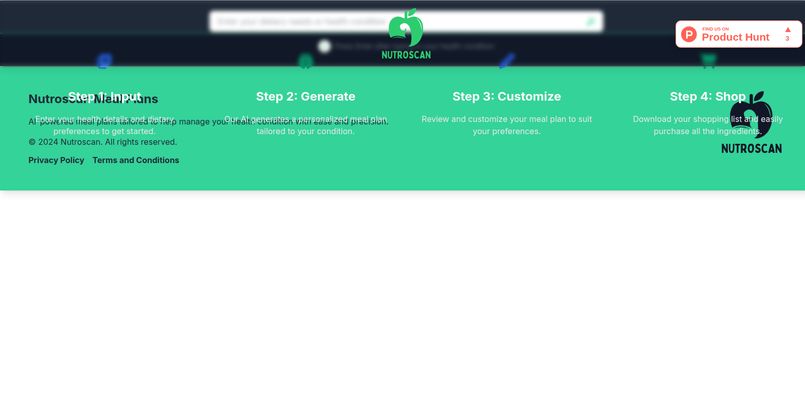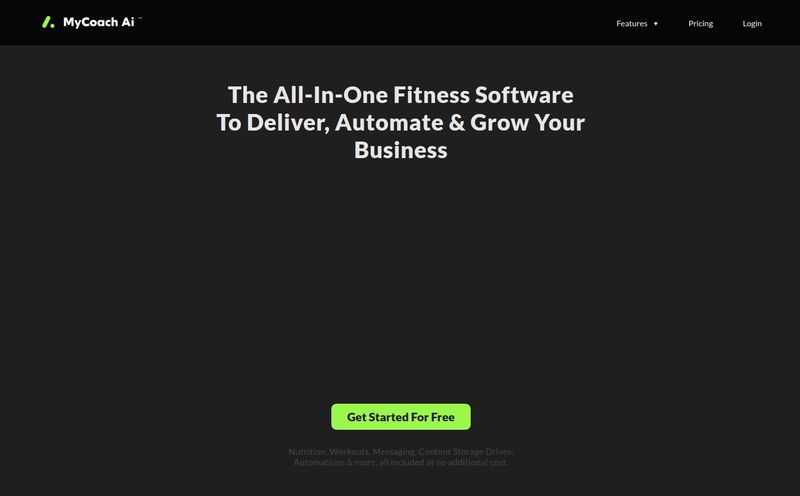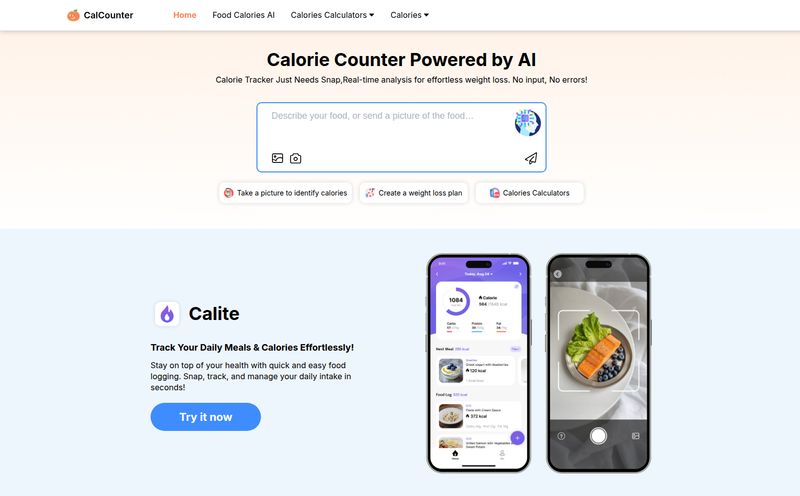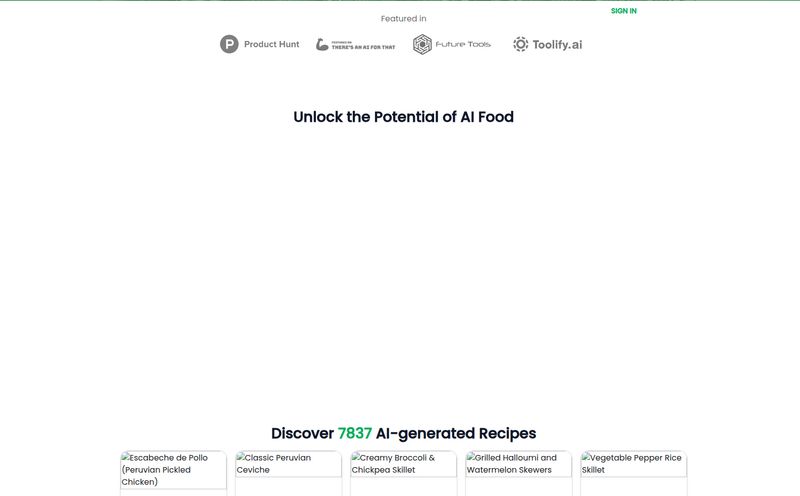Meal planning can be a special kind of purgatory. Every Sunday, that little voice pipes up, "So... what are we eating this week?" And if you're juggling a specific health condition, a food intolerance, or just trying to hit some very particular nutrition goals, that question gets a whole lot louder. It's not just about what's tasty; it's about what won't make you feel like garbage. For years, my process involved a chaotic mess of saved bookmarks, angry Googling ("gluten-free AND low-fodmap dinner ideas that don't taste like cardboard"), and scribbled notes that looked like a detective's conspiracy board.
So when I stumbled across a new tool called Nutroscan, my inner SEO-nerd and my perpetually-tired-of-cooking-self both sat up and paid attention. The pitch? AI-powered personalized meal plans tailored to your actual health conditions. Not just “low-carb.” We’re talking plans for managing things like diabetes, PCOS, or Crohn's. It sounded almost too good to be true. Another AI startup promising to solve all my problems? Color me skeptical, but intrigued.
So, I rolled up my sleeves and decided to see if this thing was just another flash in the pan or something genuinely useful.
So What Is Nutroscan, Exactly?
Think of Nutroscan as a hyper-focused nutritionist living in your browser. Its one and only job is to take your specific health data, dietary preferences (and aversions!), and budget, and then churn out a weekly meal plan that actually makes sense for you. It’s not a general fitness app with a slapped-on meal planner. It’s built from the ground up for the person who has to read every single label at the grocery store.
The core idea is to remove the crippling decision fatigue and the endless research that comes with a restrictive diet. Instead of you spending hours trying to figure out if a certain food will trigger a flare-up, the AI, supposedly backed by nutritional science, does the heavy lifting. A pretty bold claim, if you ask me.
The Four-Step Dance of AI Meal Planning
The process itself is refreshingly simple. I appreciate a platform that doesn't make me hunt through ten menus to find the main event. It boils down to a four-step process they lay out right on their homepage.
Step 1: Input. This is the most crucial part. You tell the AI everything. Your health conditions, allergies, the foods you hate with a fiery passion, your budget, and how much time you're willing to spend in the kitchen. The more honest and detailed you are, the better the result. Garbage in, garbage out, as they say.
Step 2: Generate. You hit the button and let the magic happen. The AI takes your personal manifesto of needs and builds a weekly meal plan from scratch. Breakfast, lunch, dinner, snacks... the whole shebang.

Visit Nutroscan
Step 3: Customize. This is a nice touch. The AI gives you its best shot, but you're not locked in. Don't feel like chicken on Tuesday? You can review and tweak the plan, swapping meals or making adjustments until it looks like something you’d actually eat.
Step 4: Shop. And this, my friends, is the chef’s kiss. Once you’re happy with your plan, Nutroscan automatically generates a shopping list. No more forgetting the one crucial ingredient or buying a jar of something you already have three of. It's organized and ready to go.
The Good, The Bad, and The AI-Generated Salad
Alright, so the process is slick. But does it deliver? Like any tool, it has its brilliant moments and a few... quirks. I've been in the digital marketing and tool-testing game for a long time, and I've learned that nothing is perfect.
What I Genuinely Liked
The deep personalization is, without a doubt, the star of the show. I've tested other meal planners that let you filter by 'vegetarian' or 'gluten-free', but Nutroscan goes deeper. The ability to input a specific medical condition is a game-changer. It understands the 'why' behind your diet, not just the 'what'. The AI isn’t just avoiding gluten; it’s building a plan that supports, say, an anti-inflammatory protocol. That’s the key.
And that automatic shopping list? A life-saver. Seriously. It takes the most tedious part of the process and completely automates it. For busy professionals or parents trying to manage a household, this feature alone could be worth its weight in gold.
A Few Things to Keep in Mind
On the flip side, the system is only as good as the information you give it. If you forget to mention you despise cilantro, get ready for a week of meals that taste like soap to you. You have to be meticulous in that first step.
Also, let's address the elephant in the room: relying on AI for health advice. Some people will, very reasonably, be hesitant. And I get it. It’s important to state this loud and clear: Nutroscan is not a doctor. It's a tool. It's a powerful assistant designed to help you execute a plan, but it should never replace the advice of a qualified medical professional. Think of it as teh ultimate research assistant, not the head surgeon.
Finally, you might still need to do some fine-tuning. The AI might suggest a recipe that sounds great on paper but doesn't quite hit the spot for you. The customization feature is there for a reason, so expect to use it. It gets you 90% of the way there, which, frankly, is still a massive improvement.
Who is This Tool Actually For?
I don't think Nutroscan is for everyone. If you're someone who loves the spontaneity of cooking and finds joy in flipping through cookbooks, this might feel a bit too rigid. But for a few specific groups of people, I think it could be incredible.
- The Newly Diagnosed: Just been told you have a condition that requires a major diet overhaul? Nutroscan can bridge that overwhelming gap between diagnosis and daily life.
- The Busy Caregiver: Managing meal plans for a family member with specific dietary needs is a full-time job. This could automate a huge chunk of that mental load.
- The Burnt-Out Health Veteran: If you've been managing a condition for years and are just plain tired of thinking about food, this could bring some much-needed relief.
- The Data-Driven Athlete: Need to hit precise macros for performance but bored of eating the same three meals? The AI can introduce variety while staying within your strict parameters.
What's the Damage? The Pricing Question
Here's an interesting bit. As of right now, I couldn't find a pricing page. The platform is live on Product Hunt and seems to be in a phase of gathering users and feedback. What does that mean? Well, it could mean a few things. It might be in a free beta period, or they could be planning a freemium model down the line.
Personally, I see this as a huge opportunity. You can likely get in and try the full suite of features without any commitment. In a world of endless subscriptions, being able to test-drive something so thoroughly is a breath of fresh air. I'd recommend jumping in while the door is wide open.
Nutroscan vs. The Old Way of Meal Planning
| Feature | The Old Way (Googling & Guesswork) | The Nutroscan Way |
|---|---|---|
| Personalization | Generic filters, conflicting info from different blogs. | Based on specific, layered health conditions and preferences. |
| Time Spent | Hours of research, planning, and list-making. | Minutes to input data and review a generated plan. |
| Shopping List | Manually compiled, easy to make errors or forget items. | Automatically generated, accurate, and organized. |
| Confidence | Uncertainty, anxiety about whether a meal fits your needs. | Higher confidence that meals align with your health goals. |
My Final Take on Nutroscan
After spending some time with it, I'm moving from 'skeptical' to 'cautiously optimistic.' Nutroscan isn't trying to be another generic wellness app. It's a niche tool that solves a very specific, very frustrating problem. It's for the people who can't just pick a random recipe off Pinterest. It's a tool for dietary precision.
It won't chop your vegetables or do your dishes, but it takes away the most mentally taxing part of a specialized diet: the endless planning. By handing that task over to an AI, you get to reclaim your time and mental energy for, well, actually living your life. And for anyone struggling with a complex health condition, that's an invaluable gift.
Frequently Asked Questions About Nutroscan
- Is Nutroscan a replacement for a doctor or registered dietitian?
- Absolutely not. It's a powerful tool to help you implement a dietary plan, but it should always be used in conjunction with, and not as a substitute for, professional medical advice. Always consult your doctor before making significant changes to your diet.
- How accurate is the AI in creating meal plans?
- The accuracy is highly dependent on the quality of the information you provide. The more detailed you are about your conditions, preferences, and restrictions, the more accurate and useful the meal plan will be.
- Can I use Nutroscan for general weight loss or muscle gain?
- While its specialty is managing health conditions, the core function of creating plans based on specific goals means you can likely use it for general goals like weight management or hitting macro targets. Just input those goals during the setup process.
- What kinds of health conditions can it handle?
- The platform is designed to cater to a wide range of conditions like diabetes, IBS, celiac disease, food allergies, and more. The best way to know for sure is to visit the site and see if your specific needs are listed in the input options.
- How does the shopping list generator work?
- After you finalize your meal plan for the week, the tool aggregates all the necessary ingredients from all the recipes. It creates a single, organized list that you can take to the store, either on your phone or as a printout.
- Is my personal health data safe?
- This is a critical question for any health-related app. According to their Privacy Policy, they take user data seriously. However, as with any online service, it's always a good practice to review the privacy policy yourself to ensure you're comfortable with how your information is handled.
Reference and Sources
- Nutroscan Official Website
- Nutroscan on Product Hunt
- Perspective on AI in Healthcare (National Center for Biotechnology Information)



